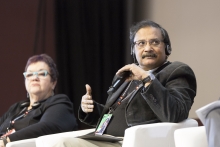Salute to Amit Sengupta!

He graduated from the Maulana Azad Medical College in Delhi in the 1980s and established a general practice. This was however just for a short while. Convinced of the need for the expansion of scientific knowledge and making this accessible to the average woman and man, he left general practice to help build the Delhi Science Forum and later the All India People’s Science Movement. By the early 1990s, he got involved in the Total Literacy Campaign in India, helping to teach urban and rural poor people how to read and write.
Dr Sengupta left his biggest footprints as an outstanding organiser in the global movement for health for all. The first step in this direction was taken in 2000, when he contributed to founding the People’s Health Movement (PHM).
World leaders had promised “Health for All by 2000” at the International Conference on Primary Health Care held at Alma-Ata on 6-12 September 1978. With their failure to deliver on this promise, it became clear that the people had to fight to win universal health care from below. And this could only be as public health for all.
Sengupta was one of the activists who saw the need at the turn of the century to take action in this direction. They organised the First People’s Health Assembly at Savar, Bangladesh where delegates adopted a People’s Charter of Health. This was where the People’s Health Movement was formed.
Over the next 18 years, Amit threw himself energetically into building PHM as a network that now spans 70 countries, bringing together organisations, academics and activists committed to the struggle for a better world with health for all.
He was associate global coordinator of the PHM and editor of the Global Health Watch (GHW) which was launched by PHM in 2005. GHW is the civil society’s alternative to the WHO’s World Health Report, which contextualises the global state of health within the social-economic and political dynamics of the world.
Amit was also the moving spirit behind the WHO Watch which brings young health activists and academics together as volunteers during WHO governing bodies’ meetings. They analyse items on the agenda of these meetings and document proceedings from a people’s perspective, making them available at real time to public health activists across the world, electronically.
In the last two years, PHM has become a close ally of PSI, and Amit a very good friend, brother and comrade of ours. After discussions with him, PSI gladly made the conference hall at our head office always available for the WHO Watch workshops. We were also proud to have had him on the health panel during the 30th PSI World Congress in 2017. And, Amit Sengupta has been the only person from outside PSI to have contributed an article, at our request, for the Right to Health.
His death is a great loss to us. He will be missed not only because of his tireless drive and selfless contributions, but as well for his wittiness, simplicity and rich sense of humour. We will remember his message at the PSI World Congress that we have to fight politically, including marching on the streets to win the full realisation of universal public health care. And we will also never forget the ripples of his soft laughter.
We extend our condolences to his wife Tripta, and son, Arijit. Whilst Amit is irreplaceable, we pray they find solace in knowing his work touched lives across the globe and will continue to inspire many more, until health for all is won.

